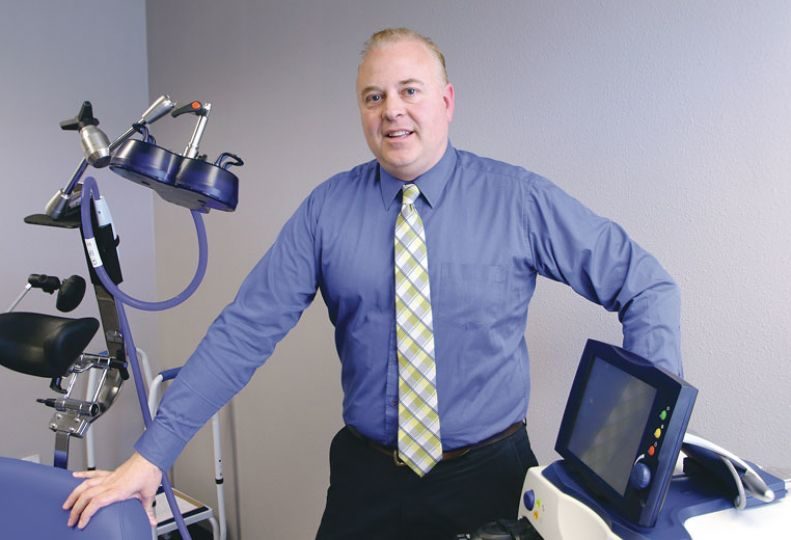
Home » Psychiatric Solutions seeks to fill mental health gaps
Psychiatric Solutions seeks to fill mental health gaps
Partial hospitalization program meant to help recently released patients

May 10, 2018
In an attempt to fill in what’s believed to be a gap in psychiatric care here, Spokane Valley-based Psychiatric Solutions opened in January with its mission to help patients recently released from psychiatric hospitals transition more effectively back into daily lives.
“When a person comes out of a hospital, that can be a very traumatic thing for them,” says the clinic’s executive director Joseph Judd. “So, to go home and try pick up where they left off and only seeing their mental health provider for the customary once-a-week session often isn’t going to be enough care for a lot of people,” Judd says.
The lack of support and assistance frequently creates a revolving door for patients who then find themselves back in the hospital for psychiatric evaluation, he says.
“They may not have met the criteria to stay in the hospital, but they also didn’t have the ability to maintain themselves well in the community,” Judd says. “That’s that gap; that level of care that’s missing in Spokane and surprisingly in a lot of our state.”
Operating out of its 8,300-square-foot building at 1620 N. Mamer, just east of Multicare Valley Hospital, and just south of Interstate 90, Psychiatric Solutions offers what it calls a partial hospitalization program.
The program serves as an outpatient service that offers daily intensive treatment for patients for three to six hours per day for as long as three months, if necessary. Most post-hospitalization treatments tend to be short term, he says.
Psychiatric Solutions employs its own psychiatrist, a nurse practitioner, a clinical supervisor licensed in both social work and chemical dependency treatment, a licensed mental health counselor, a program coordinator, a medical assistant, and a business development manager, says Judd, who is also a licensed mental health counselor.
“Our goal is to help them get back to their full-time therapist,” Judd says.
Judd says Psychiatric Solutions also can serve as an effective resource for those seeking help before they reach the point of requiring psychiatric observation at a hospital.
Psychiatric Solutions offers medication management, individual therapy, partial hospitalization programs, and intensive outpatient programs.
“We can also be preventive medicine and can connect up with area providers, so that when they’ve got someone who they feel is really headed down a path that could lead to the hospital, or an attempt (at suicide), this can be a place where people are referred,” Judd says.
The clinic also offers transcranial magnetic stimulation, a form of treatment that involves a series of brief, repetitive, and highly focused magnetic pulses designed to stimulate brain cells.
TMS targets those areas of the brain where electrical activity is known to be reduced in people suffering from depression, Judd says.
TMS was approved by the U.S. Food and Drug Administration roughly a decade ago for patients who often suffer from major depressive disorder and who haven’t benefitted from prior anitdepressant medication.
The full treatment of transcranial magnetic stimulation typically involves a 30- to 45-minute outpatient procedure for as many as five days a week for up to a month-and-a-half, TMS treatment providers say.
At Psychiatric Solutions, overall outcomes aren’t yet quantifiable, as the clinic just opened for business at the beginning of the year and continues to market itself in the community, he says.
“Both the Spokane Valley Chamber and GSI (Greater Spokane Incorporated) came together and really put on an event for us,” Judd says.
The eight employees here are affiliated with their Chico, Calif-based sister company named Therapeutic Solutions, Judd says.
That company was founded in Chico by Dr. Ahmed Abouesh a little more than a decade ago. Judd says Abouesh began his early medical career as a neurosurgeon on the East Coast.
“He travels up here quite a bit and is fully licensed to practice here,” Judd says of Abouesh.
He adds, “Dr. Abouesh really felt like there was a need for better approaches. There are some great clinics and great clinicians out there, but he felt like there were pieces that were missing. He developed Therapeutic Solutions with the intent to meet those needs and it’s developed over time.”
Judd became a licensed mental health care clinician 20 years ago and started his career in Southern California before moving to Spokane, where we worked with other mental health providers before meeting Abouesh, who recruited him to start Psychiatric Solutions.
“I was really concerned that with the integration of medical and behavioral medicine coming together, I wanted to make sure that it was done right so that behavioral health is seen as an important focus and not an afterthought,” he says.
Dating as far back as a century, mental health has always had a stigma, Judd says.
“People really didn’t know what to do, or understand what happens when a person experiences a mental illness,” he says. “Even in the medical community and scientific community, it really hasn’t been recognized until really very recently.”
Says Bethany Osgood, Psychiatric Solutions’ business development manager, “If I show up to the emergency room with a broken arm, we can X-ray it and create a tangible plan to fix it. That’s not the case with mental illness.”
Expanding on Osgood’s analogy, Judd says, “You’re not going to show up to the emergency room with a broken arm and be told, ‘Just deal with it.’ And that’s been a large part of the history to the response to mental illness.”
Judd says it’s in the best interest of employers to assist their workers as necessary, as lost productivity in the workplace nationwide costs billions of dollars annually, according to several scientific and workplace studies.
“Sometimes money talks, and if that’s what gets people to step and notice, ‘Oh, wait, there’s a big problem here,’ then so be it,” Judd says.
Latest News Special Report Health Care
Related Articles
Related Products




